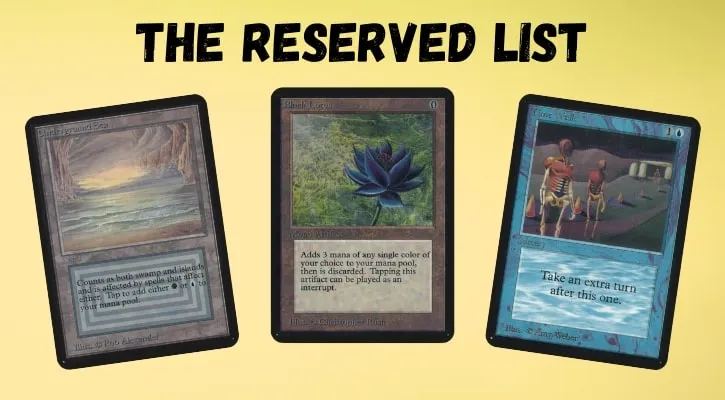1. What Is the MTG Reserved List?
Origins & Purpose
The MTG Reserved List was created in 1996 by Wizards of the Coast (WotC) to reassure collectors after backlash from the 1995 set Chronicles, which reprinted many older cards and caused a dip in their value. In response, WotC made a binding promise: certain cards would never be reprinted in tournament-legal sets, ensuring their scarcity.
Official Policy
Wizards’ current Reserved List policy is clear:
- No Reserved List cards will be reprinted in any tournament-legal product, in foil or non-foil.
- Even functional reprints (cards with different names but identical effects) are avoided.
This commitment has held firm despite pressure from players, investors, and game designers.
Full List & Notable Cards
You can view the official Reserved List here:
👉 Wizards of the Coast – Reserved List
Notable Reserved List cards include:
- 🌋 Underground Sea, Volcanic Island (Dual Lands – cEDH staples)
- 💎 Mox Diamond
- 🌳 Gaea’s Cradle
- 🔥 Wheel of Fortune
- 💡 Lion’s Eye Diamond (LED)
- 🧙♂️ The Tabernacle at Pendrell Vale
2. Market Impact & Price Trends
Card Values: Appreciation Over Time
Reserved List cards have consistently appreciated in value due to artificial scarcity. According to MTGStocks, Underground Sea rose from ~$200 in 2018 to over $800+ in 2024. Cards like Gaea’s Cradle and LED regularly sell for $500–$1,200, depending on condition.
Speculation & Hoarding
Investors and speculators often hoard Reserved List cards as a non-volatile asset, treating them like Magic’s version of cryptocurrency. This activity further limits availability and inflates prices beyond reach for most players.
CEDH/Legacy Barriers
Formats like Legacy and CEDH are disproportionately affected:
- Competitive decks often require multiple Reserved List cards.
- Many staple lands (Tundra, Savannah, Tropical Island) are financially inaccessible.
- The list locks power behind a paywall, stifling growth in non-rotating formats.
3. Controversies & Community Debate
Arguments for Abolishing It
Critics argue the Reserved List:
- Limits new player access to powerful formats.
- Hinders competitive diversity.
- Encourages speculation over gameplay.
Abolishing it could revitalize Legacy and EDH by making powerful cards more accessible—though at the cost of collector confidence.
Wizards’ Stance
Wizards of the Coast has reiterated multiple times (most recently in 2021) that they will not break the Reserved List, citing:
- Legal obligations tied to early promises.
- Potential class-action lawsuits from collectors.
- Risk of damaging long-term brand trust.
The Proxy Movement
To counteract these problems, players have increasingly turned to proxies for kitchen table, EDH, and cEDH play.
Abyss Proxy Shop offers tournament-quality proxies of Reserved List cards for testing, casual play, and collection-building—without breaking the bank. You can find staples like Gaea’s Cradle, Wheel of Fortune, and Mox Diamond in stunning detail and affordable prices.
👉 Explore the most popular Reserved List proxies at Abyss Proxy Shop
4. Best Reserved List Cards to Own
Competitive Staples
For players building serious Commander or Legacy decks, these cards are top-tier investments:
- 🔥 Wheel of Fortune (EDH power draw)
- 💡 Lion’s Eye Diamond (combo engine)
- 🌳 Gaea’s Cradle (green ramp engine)
- 💎 Mox Diamond (mana fixing + speed)
- 🌊 Dual Lands like Underground Sea, Tropical Island (format-legal and unmatched)
Budget Alternatives
Some functional alternatives exist:
- Boros Charm or Reforge the Soul for Wheel effects
- Elvish Archdruid or Growing Rites of Itlimoc for Cradle-lite
Or, you can use high-quality proxies from Abyss Proxy Shop to replicate these powerful effects at a fraction of the cost. Great for testing, home play, and even casual pods.
5. How to Play with Reserved List Cards
Buying Originals: Pros & Risks
Collectors who want the “real thing” must navigate:
- Price volatility
- Risk of counterfeit cards
- Grading confusion (BGS vs. PSA vs. raw)
Trusted auction sites and local game stores can be helpful—but expensive.
Proxy Solutions: Affordable, Ethical Play
In casual formats like Commander, proxies are widely accepted. They’re perfect for:
- Budget-minded players
- High-powered decks
- Testing new brews before investing
Sites like Abyss Proxy Shop offer premium, tournament-quality proxies with stunning art and clarity—ideal for both casual pods and collectors looking for test decks.
👉 Browse top-selling Reserved List proxies at Abyss Proxy Shop
Community Rules & House Agreements
Before using proxies, talk to your playgroup. Most EDH pods allow them, especially when they enable competitive balance. Some even require proxies for budget parity.
6. The Future of the Reserved List
Will It Ever End?
Unlikely, but cracks are showing:
- The 30th Anniversary Edition included non-tournament proxies of Reserved List cards—WotC’s first real “toe in the water.”
- Player backlash was mixed, but it demonstrated demand for access over scarcity.
Better Alternatives Wizards Could Explore
If WotC won’t end the Reserved List, they could:
- Expand The List (cards in Set Boosters)
- Offer more Secret Lair proxies
- Create Arena or Commander-exclusive versions (not legal in Legacy/Vintage)
None fully solve the Reserved List problem—but each is a step toward player accessibility.
Final Thoughts: Reserved List Realities
The MTG Reserved List represents a philosophical divide in Magic: collector value vs. player access. While it protects investments, it also gates power behind extreme costs—especially in Commander and Legacy.
Players who want to play the game without breaking the bank have found an elegant workaround: proxies.
Abyss Proxy Shop offers high-quality, affordable ways to bring Reserved List power to your table, guilt-free.
